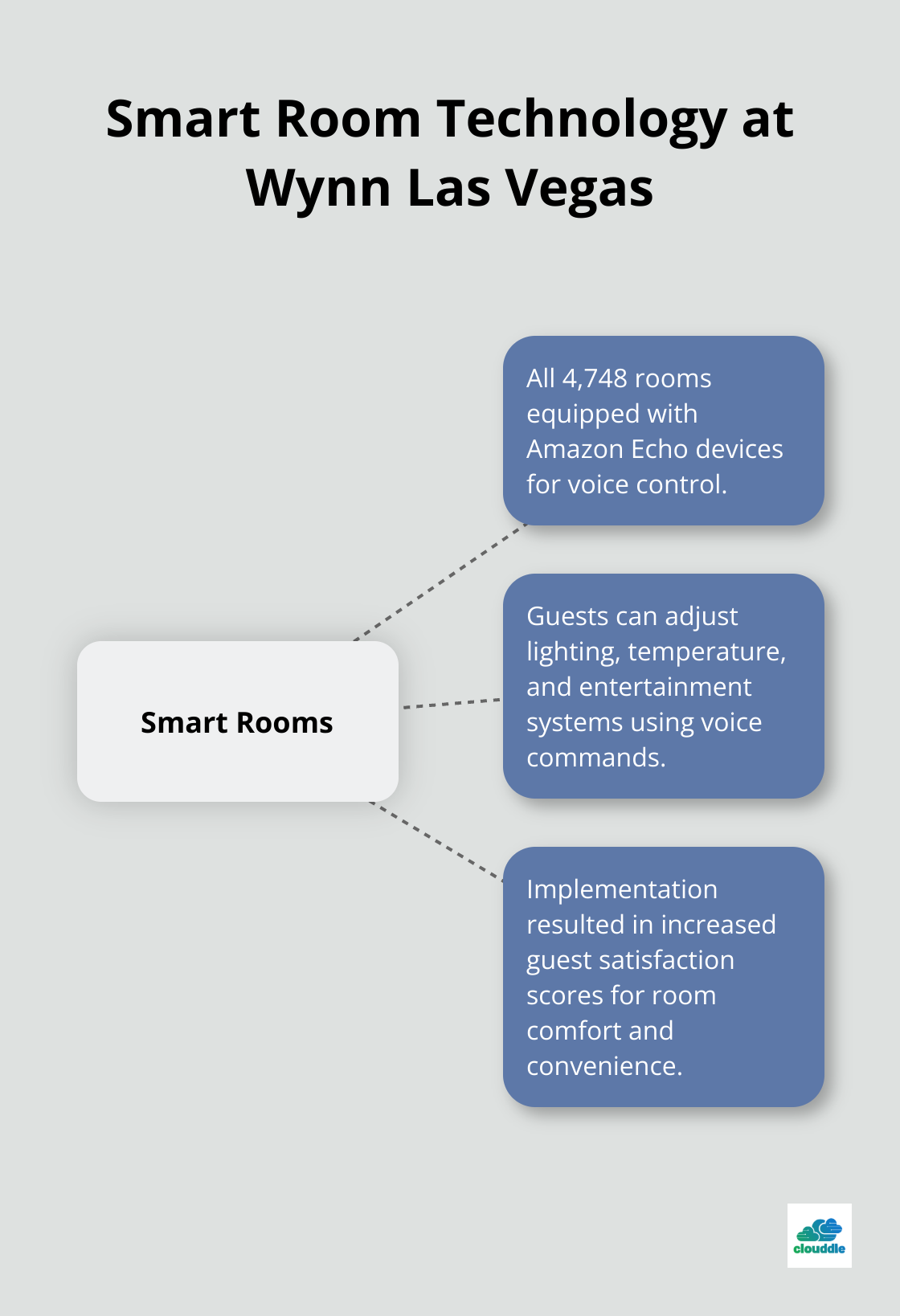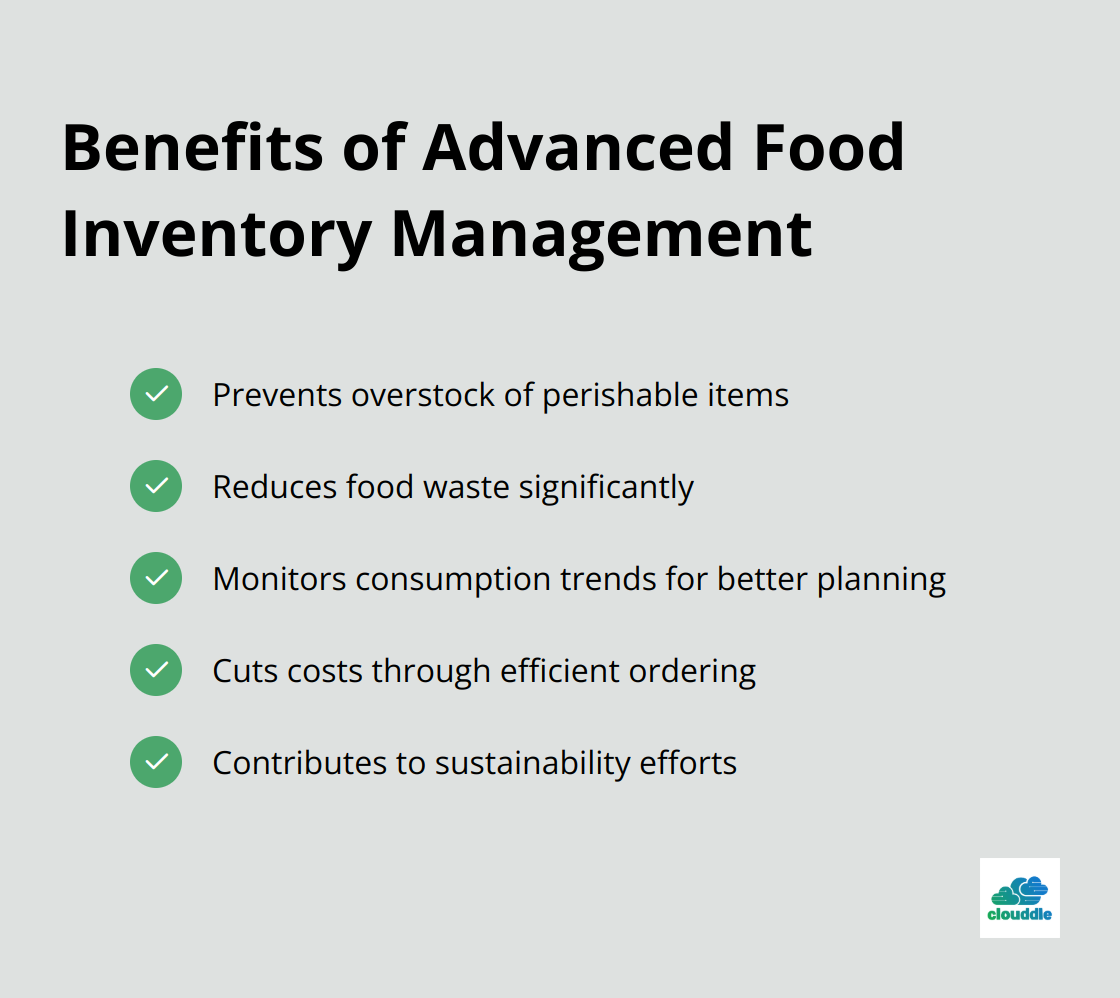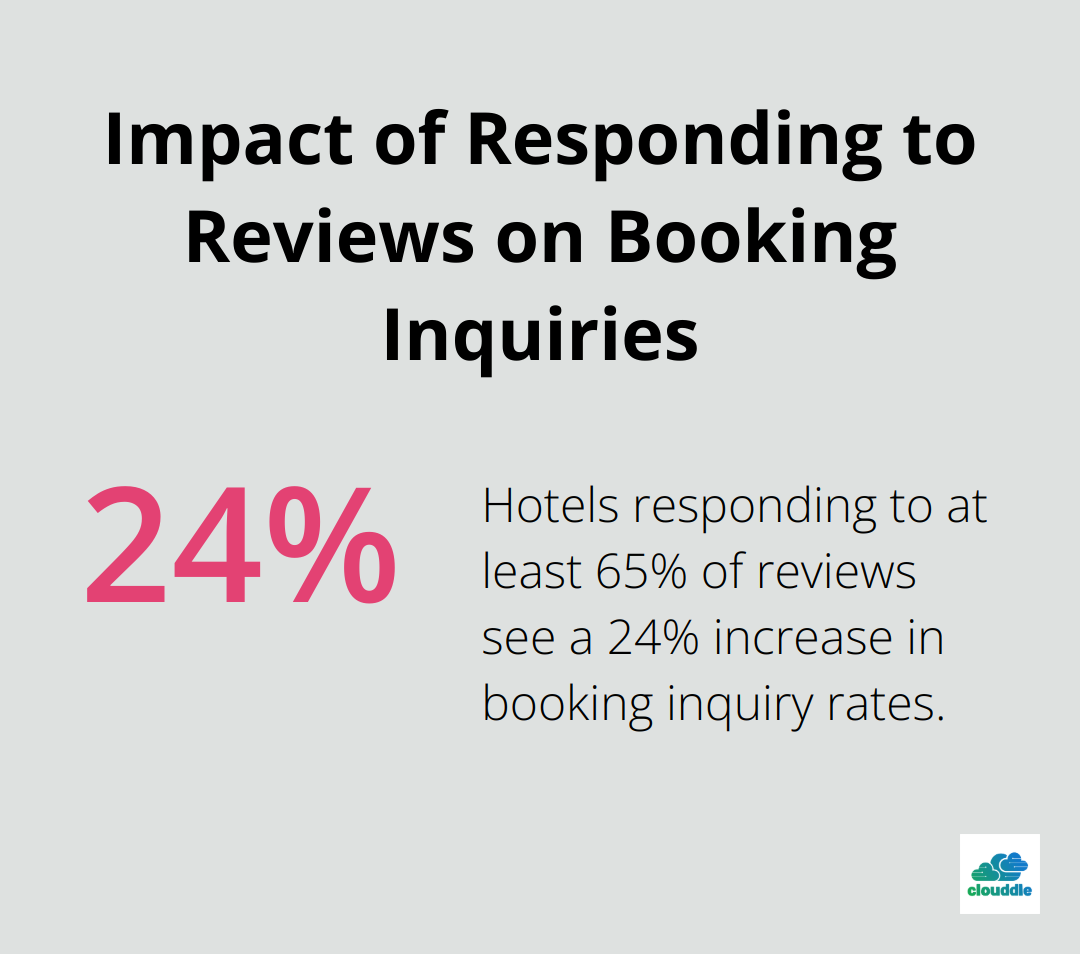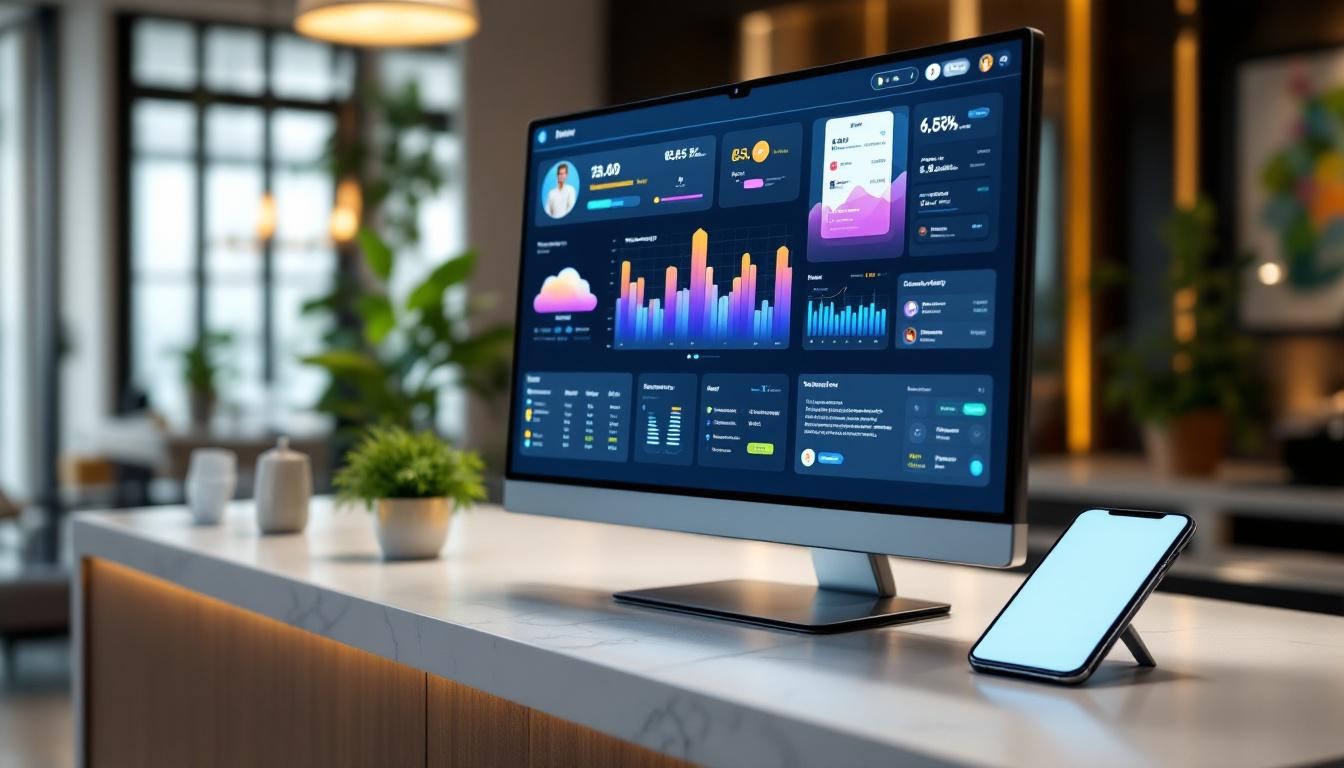The hospitality industry is undergoing a digital transformation. Information technology applications in the hospitality industry are reshaping how hotels operate and serve their guests.
At Clouddle, we’ve seen firsthand how these innovations are boosting efficiency, personalizing experiences, and driving revenue growth. This post explores the game-changing IT solutions that are setting new standards in hospitality.
How IT Enhances Guest Experience in Hospitality
The hospitality industry is experiencing a digital revolution. IT solutions are setting new standards, transforming how hotels operate and serve their guests. This shift focuses on creating more personalized, efficient, and seamless experiences through technology.
Mobile Check-in and Keyless Entry Systems
Hotels are rapidly adopting mobile check-in and keyless entry systems. Smart hotels now include automated room controls, AI-driven concierge services, keyless entry systems, and robust data analytics. This technology reduces wait times and empowers guests with more control over their stay.
Hilton’s Digital Key system exemplifies this trend. It allows guests to bypass the front desk, choose their room, and access it directly through their smartphone. This innovation not only boosts guest satisfaction but also allows staff to focus on addressing more complex guest needs.
Data-Driven Personalization
Data analytics has revolutionized how hotels understand and cater to their guests. By analyzing guest preferences, behavior, and feedback, hotels now offer truly personalized experiences.
Marriott’s Bonvoy app chatbot provides personalized offers for the most memorable experience during the guests’ stay, whether they’re traveling for family, solo, or business purposes. Hotels using similar systems have seen an increase in guest satisfaction scores.
Smart Room Technology
In-room technology represents another area where IT makes significant strides. Smart room controls allow guests to adjust lighting, temperature, and entertainment systems from their smartphones or through voice commands.
The Wynn Las Vegas demonstrates the impact of this technology. They equipped all 4,748 rooms with Amazon Echo devices, enabling guests to control various room features with voice commands. This investment resulted in an increase in guest satisfaction scores related to room comfort and convenience.

Robust Networking Infrastructure
To implement these technologies effectively, hotels need a strong networking foundation. Solutions like Network as a Service (NaaS) provide the necessary backbone for these advanced guest-facing technologies without requiring significant upfront investment.
These IT-driven enhancements significantly improve guest experiences, leading to higher satisfaction rates, increased loyalty, and ultimately, better revenue. The key lies in thoughtful implementation, ensuring these technologies add real value to the guest experience rather than serving as mere flashy additions.
As we move forward, let’s explore how advanced IT systems streamline hotel operations, further enhancing the overall guest experience.
How Hotels Streamline Operations with IT
The hospitality industry embraces advanced IT systems to streamline operations, boost efficiency, and enhance guest satisfaction. These technologies transform how hotels manage their resources, inventory, and staff.
Revolutionizing Bookings and Resource Allocation
Property Management Systems (PMS) have become the backbone of hotel operations. These systems integrate various aspects of hotel management, from reservations to check-out processes. With a PMS, hotels can track performance, get statistics, and adjust processes to become more efficient, potentially boosting occupancy rates.
PMS solutions also enable hotels to optimize resource allocation. They provide real-time data on room availability, allowing staff to make quick decisions on room assignments and maintenance schedules. This level of efficiency proves essential in today’s fast-paced hospitality environment.
Mastering Inventory and Supply Chain Management
Effective inventory management is vital for hotels to maintain quality service while controlling costs. Modern inventory and supply chain management software offers real-time tracking of supplies, automated reordering, and predictive analytics for demand forecasting.
Advanced food inventory management has proven to be a critical tool for reducing waste, helping businesses prevent overstock, monitor trends, and reduce waste. These systems not only cut costs but also contribute to sustainability efforts (an increasingly important factor for environmentally conscious guests).

Empowering Staff Through Technology
Staff management and communication platforms transform how hotel teams operate. These tools streamline scheduling, task assignment, and interdepartmental communication.
These platforms also facilitate instant communication between staff members, ensuring quick resolution of guest issues and smoother operations. Hotels using such systems have reported faster response times to guest requests, significantly improving guest satisfaction scores.
Hotels implementing comprehensive IT solutions often see an increase in operational efficiency. Network as a Service (NaaS) solutions provide the robust infrastructure needed to support these advanced systems, ensuring seamless integration and operation without the need for significant upfront investment.
As the hospitality industry continues to evolve, the integration of these IT systems will be essential for hotels aiming to stay competitive and meet the ever-increasing expectations of tech-savvy guests. The key lies in choosing the right combination of technologies that align with your hotel’s specific needs and guest demographics.
Now that we’ve explored how IT streamlines hotel operations, let’s examine how data can be leveraged for marketing and revenue management in the hospitality industry.
How Data Drives Hotel Marketing and Revenue
Targeted Marketing Through CRM
Customer Relationship Management (CRM) systems transform hotel marketing. These systems collect and analyze guest data, which allows hotels to create highly targeted marketing campaigns. The Ritz-Carlton uses its CRM system to track guest preferences and tailor experiences accordingly. This approach enhances comfort and satisfaction for guests.
CRM systems allow hotels to segment their audience based on factors like booking history, preferences, and spending patterns. This segmentation enables personalized email campaigns, targeted promotions, and customized loyalty programs.
Dynamic Pricing with Revenue Management Systems
Revenue Management Systems (RMS) transform how hotels price their rooms. These systems use historical data, current market conditions, and predictive analytics to optimize pricing in real-time. Marriott International’s implementation of an advanced RMS led to higher RevPAR and unit growth, contributing to an increase in base management fees.
RMS tools consider factors such as seasonality, local events, and competitor pricing to suggest optimal rates. They also enable hotels to implement more sophisticated pricing strategies (such as length-of-stay pricing or package deals).
Reputation Management in the Digital Age
In today’s digital world, a hotel’s online reputation can make or break its success. Social media monitoring and reputation management tools have become essential for hotels to track and respond to guest feedback across various platforms.
TripAdvisor reports that hotels which respond to at least 65% of their reviews see a 24% increase in booking inquiry rates compared to those who don’t respond to reviews. Tools like Revinate help hotels aggregate reviews from multiple platforms, which allows for quick responses and identification of recurring issues.

These tools also provide valuable insights into guest sentiment, which helps hotels identify areas for improvement. For instance, analysis of social media mentions led the Four Seasons Hotel George V in Paris to introduce a popular new cocktail menu (directly addressing guest feedback).
Data-Driven Decision Making
Hotels that leverage these data-driven tools can create more effective marketing strategies, optimize their pricing, and maintain a positive online reputation. The key lies in choosing the right tools that align with your hotel’s specific needs and consistently acting on the insights they provide.
Clouddle’s Network as a Service (NaaS) solution provides the robust infrastructure needed to support these advanced data-driven systems, ensuring seamless integration and operation without the need for significant upfront investment.
Wrapping Up
Information technology applications in the hospitality industry have transformed how hotels operate and serve guests. These technologies enhance guest experiences, streamline operations, and optimize revenue streams. Hotels that embrace these innovations gain a competitive edge by offering personalized experiences that modern travelers expect.
The future of hospitality will bring even more exciting technological developments. Artificial intelligence, virtual reality, and the Internet of Things will likely expand their roles in creating interconnected and efficient hotel ecosystems. A robust IT infrastructure becomes essential for hotels to implement and adapt to these emerging technologies.
Network as a Service (NaaS) from Clouddle provides the necessary backbone for advanced hospitality technologies without significant upfront investment. This solution allows hotels to stay agile and adapt to new trends. The future of hospitality lies in the integration of technology with traditional values, creating memorable experiences and building lasting relationships with guests.


